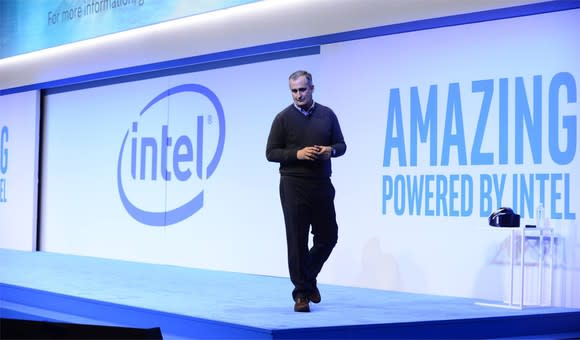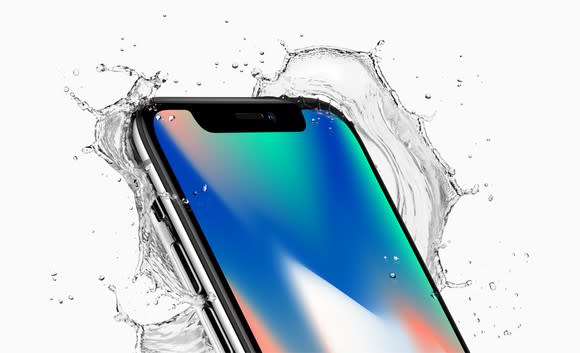3 Reasons Intel Should Buy Qualcomm Inc.
Broadcom(NASDAQ: AVGO) recently abandoned its hostile bid for Qualcomm (NASDAQ: QCOM) after President Trump blocked the deal on security concerns. On its own, Qualcomm faces tough headwinds -- regulators and OEMs are attacking its licensing business, and the approval of its planned buyout of NXP (NASDAQ: NXPI) remains stuck in regulatory limbo in China.
However, Qualcomm also remains a lucrative buyout target in its weakened state. It's lost a quarter of its market value since it hit a multi-year high in mid-2014, and the majority of its shareholders were ready to approve Broadcom's six board nominees before the deal was blocked.

Image source: Intel.
Therefore, any tech company which was eyeing Qualcomm before should strike soon. I personally believe the most logical suitor is Intel (NASDAQ: INTC), for three simple reasons.
1. Reclaiming the mobile market
One of Intel's biggest mistakes over the past decade was losing the mobile SoC (system on chip) market to Qualcomm in three steps. First, it refused to produce SoCs for the iPhone, believing that Apple would never sell the device in large enough quantities.

Image source: Apple.
Second, it underestimated the appeal of low-powered ARM chips over x86 ones, and sold its ARM chip producer, XScale, to Marvell in 2006.
Lastly, Intel's own Atom x86 chips, which were aimed at mobile devices, failed to match most ARM chips in terms of power efficiency. Meanwhile, Qualcomm wiped out the competition and emerged as the market leader in ARM SoCs -- making it the largest mobile chipmaker in the world.
Intel attempted to reenter the mobile market by paying OEMs billions of dollars in subsidies, but it ended up with less than 1% of the market. Intel eventually regained a foothold with its baseband modems, which Apple started using in its iPhones alongside Qualcomm's modems in 2016. Intel and Qualcomm are both investing heavily in 5G technologies, so pooling the two company's resources would be a smart long-term move.
If Intel buys Qualcomm, it would instantly control 42% of the smartphone application processor market, according to Counterpoint's third quarter numbers. That would make Intel the top maker of chips for PCs, data centers, and mobile devices in the world.
2. Widening its moat in PCs and data centers
Speaking of PCs and data centers, Qualcomm is emerging as a threat to Intel in both markets. Last year, Qualcomm partnered with Microsoft (NASDAQ: MSFT) to launch ARM-powered Windows 10 laptops, and ported Windows Server for ARM chips.

Image source: Getty Images.
The two companies then showcased a Windows Server running on Qualcomm's Centriq 2400-series data center chip -- which targets Intel's flagship Xeon chips. Qualcomm claims that its 48-core Centriq 2460 offers a four-fold improvement in performance per dollars against Intel's Xeon Platinum 8180.
Qualcomm clearly wants to expand into Intel's backyard, and a lot of tech giants -- including Alibaba, Hewlett-Packard Enterprise, and Samsung -- are already testing out its data center chips.
If Intel buys Qualcomm, it can offer both x86 and ARM CPUs for PCs and data centers -- which would give it a lot of flexibility against its smaller rival AMD.
3. Autos and adjacent markets
Intel and Qualcomm are both expanding into the automotive, computer vision, and Internet of Things (IoT) markets to diversify away from their core businesses. Intel previously acquired computer vision start-ups Movidius and Itseez, along with advanced driver assistance systems (ADAS) maker Mobileye, to bolster these next-gen efforts.
Qualcomm previously bought CSR, a maker of IoT and automotive chips, and is currently trying to close its purchase of NXP, the biggest automotive chipmaker in the world. It sells custom Snapdragon chips for cars, drones, wearables, and other devices, and it's partnered with Himax in the development of depth-sensing camera systems.
Buying Qualcomm would eliminate a key rival in these markets, reduce costs, and give Intel big bundling opportunities across multiple markets.
But can Intel pull off such a huge deal?
Intel is still integrating its previous acquisitions of Movidius and Mobileye, so it's unclear if the chipmaker is ready to move in on Qualcomm. Matching Broadcom's final offer of $117 billion for Qualcomm would be a monumental task, even for one of the world's biggest chipmakers.
Intel finished last year with $14 billion in cash and equivalents in the US. It holds an estimated $27 billion overseas, which it will likely repatriate due to tax law changes. It's also shouldering $25 billion in long-term debt.
This means that Intel would need to spend all of its cash, take on more debt, and make up the difference with stock to come close to $117 billion. The deal would also be scrutinized by antitrust regulators, who probably don't want a single chipmaker to dominate the PC, data center, and mobile markets. Nonetheless, it's an enticing opportunity, and I wouldn't be surprised if Intel is mulling a takeover right now.
More From The Motley Fool
Teresa Kersten is an employee of LinkedIn and is a member of The Motley Fool's board of directors. LinkedIn is owned by Microsoft. Leo Sun has no position in any of the stocks mentioned. The Motley Fool owns shares of and recommends Apple. The Motley Fool owns shares of Qualcomm and has the following options: long January 2020 $150 calls on Apple and short January 2020 $155 calls on Apple. The Motley Fool recommends Broadcom Ltd, Intel, and NXP Semiconductors. The Motley Fool has a disclosure policy.

 Yahoo Finance
Yahoo Finance 